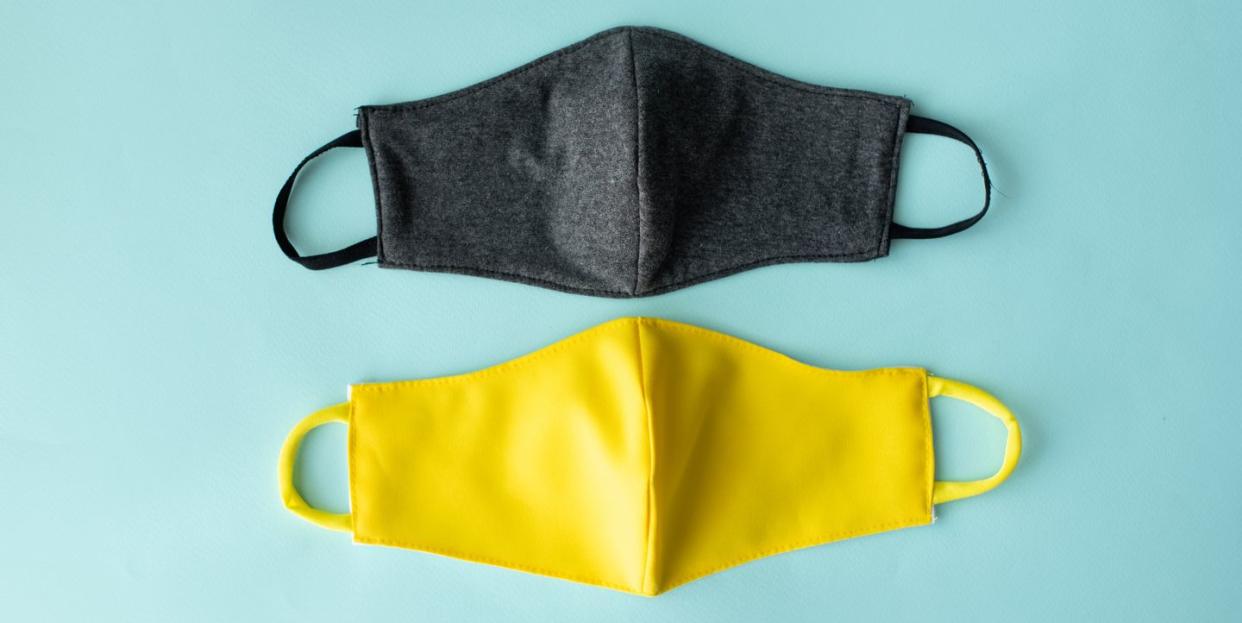How to Clean Face Masks at Home

Whether you've bought face masks from a vendor that gives back, or made them yourself with an at-home DIY, the CDC's latest guidelines have us wearing them everywhere we go. Having a few on hand to cycle through is worth it, but any excess should be donated to health care workers and first responders to help preserve the supply of PPE for those with a high risk of exposure. If we're reusing our masks for grocery runs, socially distant walks, or picking up a furry friend, what's the best way to keep them clean and avoid contamination?
Materials First
Pure cloth face masks aren't the only option out there. Scarves, neck gaiters, and repurposed clothing have been alternatives for people waiting for masks on backorder or unable to purchase them. After donating all N95 and surgical masks to hospitals, fiber dust masks, like those found in construction sites are still an option for some populations.
Disposable fiber masks should never be reused, according to the CDC. Exposing them to high heat can kill viruses, but the method will degrade the material and make it porous, so you'll be more susceptible to infection when using it.
When choosing a fabric for your face mask, a breathable, high-performance fabric is best for safe reuse. Neck gaiters, usually designed for sport-use are a great alternative, as is cotton, canvas. and denim. According to this this study by SmartAir, the tighter weave structure of these fabrics prevents small particles from passing through.
More delicate materials, like silk or synthetic sateens are more likely to degrade during cleaning and can't be sanitized as throughly. So leave the silk scarf at home.
Do Laundry Machines Kill Coronavirus?
Washing your clothes in a laundry machine with detergent at a warm temperature can kill the coronavirus. Washing with water and mild detergent and then drying on a high setting will get your mask clean and ready to reuse, according to a face mask info sheet on the CDC website.
The water in laundry machines can reach recommended heat requirements for killing viruses (167F/75C), but for hand-washers who don't have access to a washer and dryer, detergents, laundry soap, and even hand soap are strong enough to combat flu viruses, according to the CDC.
Will Hand-Washing Masks Kill the Virus?
Transmission from cloth surfaces remains low, but using gloves while handling dirty, contaminated laundry, washing your hands after each load, and refraining from touching your face is recommended to prevent any chance of infection.
Those skeptical of hand-washing have taken to the internet with plenty of alternative solutions, but what you see working in hospitals doesn't always work with consumer appliances in our homes. Patrick Gallahue, spokesperson for the NYC Health Department points to NYC Health + Hospitals guidelines for coronavirus sanitization.
"Cloth face masks can effectively be cleaned and sanitized by washing by hand or with a washing machine using regular laundry detergent. Be sure the face covering is dry before using," said Gallahue.
People should keep at least two cloth face masks on hand, so they can wash used masks at least once a day, according to the NYC Health Dept. guidelines.
Can I Use Bleach on My Face Mask?
While bleach may be great for sanitizing hard surfaces or cleaning towels and bedding, bleach is not a recommended cleaning agent for face masks—even in a diluted solution.
"Bleach or other chemical cleaning solutions should not be used on a face covering as it would be inhaled, which could cause health problems," said Gallahue.
That means no Lysol spray or Clorox wipes either.
Can I Microwave Face Masks?
While microwaves may sanitize your sponges, the type of microwave appliances found in hospitals to sanitize equipment is stronger and steadier than your at home model. Modern microwaves are certainly getting better at an even application of rays, but we can't be sure they are evenly penetrating the cloth at the right heat and wattage needed.
If your face mask had any metal, such as the flexible strips at the nose bridge, you cannot put them in your microwave for risk of fire.
Leave the microwaves and UV lights to the professionals. When it comes to face masks and other covering touching your nose, eyes, and mouth, detergent is still the safest way to make sure you are killing all of the virus.
Do Ovens Kill Coronavirus?
Many of us heard about doctors using ovens to reuse N95 masks as they run out of PPE. In a test run out of Beijing and reviewed by the US National Institute of Health, dry heat of 75C/167F for 30min is the most effective at killing the virus without degrading fibers.
A study conducted at Stonybrook University has confirmed the results of the dry heat oven tests, but they have acknowledged that their ovens are equipped with air filters that would prevent any traces of the virus escaping the oven. Those at home may feel safer using another method to disinfect their face masks that won't potentially expose their kitchen to coronavirus particles.
Fiber degradation is also why boiling your face masks in a pot of hot water isn't the best idea. Repeated introduction of high temperatures can cause holes in fabric weave, which could allow the virus to pass through your face masks. Boiling water should be the last option and used very infrequently.
Follow House Beautiful on Instagram.
You Might Also Like

